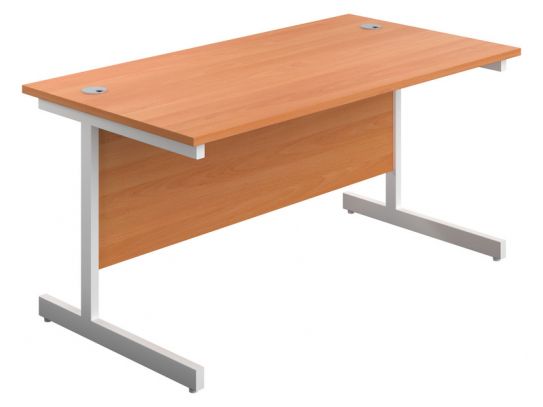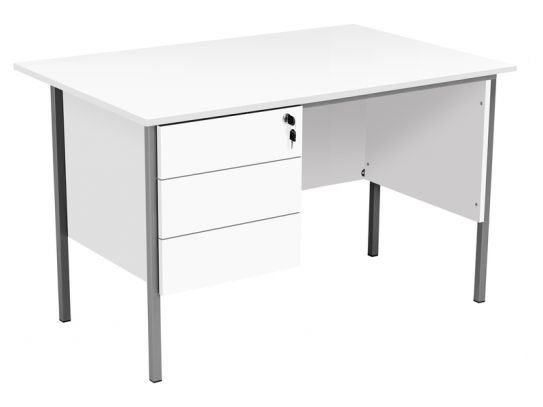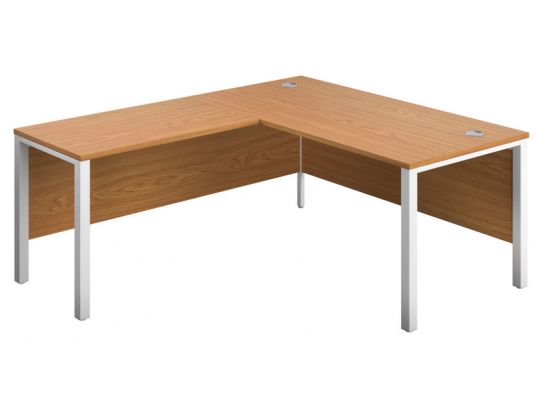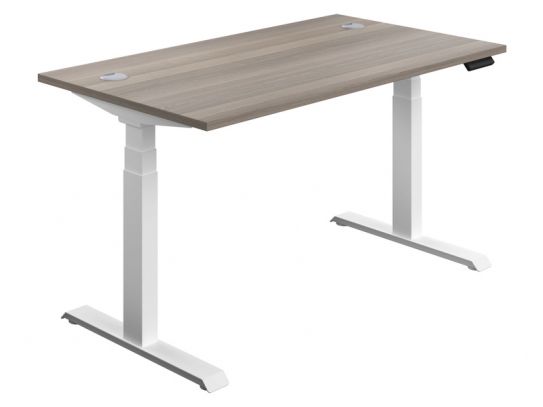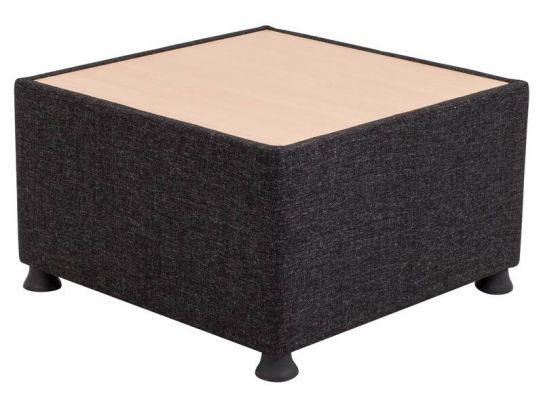Office Desks
Get the Support and Comfort You Need with Our Ergonomic Office Desks
Are you tired of boring, uninspired office desks that lack character and style? Look no further! Our range of office desks are not only practical and functional, but also full of charisma and personality. Each one is designed to add a touch of sophistication and charm to your workspace. Whether you need a simple desk for your home office or a larger, more complex one for a busy corporate environment, we have something to suit your needs.
With a variety of sizes, styles, and finishes to choose from, you'll be sure to find the perfect desk to fit your unique style. Plus, with their durable construction and high-quality materials, our desks are built to last. Don't settle for a dull, lifeless workspace. Add some charisma and style to your office with one of our amazing desks today!
What Are Office Desks?
An office desk is a type of furniture typically used in a workplace or office setting for a variety of tasks, such as writing, reading, and using a computer. Office desks are typically rectangular in shape, with a flat surface and legs to support it. They can be made from a variety of materials, including wood, metal, or glass, and come in a range of sizes and styles to suit different needs and preferences. Office desks may also include features such as drawers, shelves, and compartments to provide additional storage space and organisation. In addition to providing a workspace, office desks can also serve as a focal point in a room and help to create a professional, organised atmosphere.
What Are Some Common Uses for Office Desks?
Some common uses for office desks include writing, reading, using a computer, and other tasks that require a flat, stable surface. Office desks can be used in a variety of settings, including homes, schools, and workplaces. In a home office, an office desk can provide a dedicated space for completing work tasks, paying bills, or studying. In a school or office setting, office desks can be used by students or employees to complete assignments, take notes, or work on projects. Additionally, office desks can also serve as a central hub for organising and storing important documents, supplies, and equipment.
What Are the Different Types of Office Desks?
There are many different types of office desks to choose from, and the right type for you will depend on your needs and preferences. Some common types of office desks include:
- Traditional desks: These are rectangular desks with a flat surface and legs to support it. They can be made from a variety of materials, including wood, metal, or glass, and come in a range of sizes and styles. Traditional desks may also include drawers, shelves, and other storage options.
- Corner desks: As the name suggests, corner desks are designed to fit into the corner of a room, making them a good option for smaller spaces. They typically have a L-shaped design, with one part of the desk fitting into the corner and the other part extending out into the room. Corner desks may also have additional storage options, such as shelves or drawers.
- Standing desks: Standing desks are a type of desk that allows the user to stand while working, rather than sitting in a chair. They can be adjusted to different heights to accommodate different users, and some models even allow the user to switch between sitting and standing. Standing desks can be beneficial for improving posture and reducing the risk of health problems associated with sitting for long periods of time.
- Executive desks: Executive desks are typically larger and more elaborate than other types of office desks, and are often associated with high-level executives or other important figures. They may have a more formal, professional look, and may include additional features such as built-in storage or a built-in computer.
- Computer desks: Computer desks are specifically designed to accommodate a desktop computer, monitor, keyboard, and other related equipment. They often have a separate area for the computer tower, as well as additional space for a keyboard and mouse. Some computer desks may also have built-in storage or other features to help organise cables and other equipment.
What Are the Key Features to Consider When Choosing Office Desks?
When choosing office desks, there are several key features to consider in order to find the right one for your needs. These may include:
- Size: The size of the desk is an important consideration, as you want to make sure it will fit comfortably in your space and provide enough room for all of your equipment and supplies. Measure the available space in your office, and consider the size of your computer, monitor, and other equipment to determine the appropriate size of desk.
- Material: Office desks can be made from a variety of materials, including wood, metal, glass, and more. Each material has its own unique benefits and drawbacks, so consider the aesthetic you want to create, as well as the durability and maintenance requirements, when choosing a material.
- Style: Office desks come in a range of styles, from traditional and formal to modern and contemporary. Consider the overall design aesthetic of your office, as well as your personal preferences, when choosing a style of desk.
- Features: Office desks may have a variety of additional features, such as drawers, shelves, and compartments, to provide additional storage and organisation. Consider your needs and the types of items you will be storing on or near your desk when evaluating the features of different desks.
- Adjustability: Some office desks are adjustable, meaning they can be adjusted to different heights or configurations to suit the needs of different users. If multiple people will be using the desk, or if you want the ability to switch between sitting and standing while working, consider a desk that is adjustable.
- Price: Finally, consider the price of the desk when making your decision. Determine your budget and look for desks that offer the features and capabilities you need at a price that fits within your budget. Keep in mind that a higher-priced desk may offer better quality and durability, which can be a worthwhile investment in the long run.
How Do I Choose the Right Size Office Desk for My Space?
To choose the right size office desk for your space, follow these steps:
- Measure the available space in your office where the desk will be placed, including the width, depth, and height of the area.
- Consider the size of your computer, monitor, and other equipment that will be placed on or near the desk, and make sure there will be enough room for everything.
- Take into account any additional storage or organisation needs, and look for a desk with enough drawers, shelves, or compartments to accommodate these items.
- If multiple people will be using the desk, make sure there is enough space for everyone to comfortably sit and work.
- Consider the overall design aesthetic of your office, and choose a desk that complements the existing decor and fits in with the overall look and feel of the space.
- Keep in mind that you may need to leave some space around the desk for movement and access, so make sure the desk isn't too large for the available space.
If you're unsure about the right size of desk for your space, consider consulting a professional designer or visiting a furniture showroom to see different sizes and styles in person.
Are There Any Health Benefits to Using a Standing Desk?
Yes, there are several potential health benefits to using a standing desk. Standing desks allow the user to stand while working, rather than sitting in a chair, which can be beneficial for improving posture and reducing the risk of health problems associated with sitting for long periods of time. Some potential benefits of using a standing desk include:
- Improved posture: Standing desks can help to improve posture by forcing the user to stand up straight and engage their core muscles. This can help to reduce strain on the neck, shoulders, and back, and can prevent the development of chronic pain or other health problems.
- Increased energy and alertness: Standing while working can help to increase energy levels and alertness, as it can improve blood flow and oxygen delivery to the brain. This can help to increase productivity and focus, and can make it easier to stay awake and alert during long work sessions.
- Reduced risk of obesity and other health problems: Standing desks can help to reduce the risk of obesity and other health problems associated with sedentary behaviour. Standing burns more calories than sitting, so using a standing desk can help to increase physical activity and promote a healthy weight. In addition, standing desks can help to reduce the risk of health problems such as heart disease, diabetes, and cancer.
- Increased flexibility and range of motion: Standing desks can help to increase flexibility and range of motion by allowing the user to move around more easily and change positions throughout the day. This can help to prevent stiffness and soreness, and can improve overall physical health and well-being.
- Better overall health and wellness: Overall, using a standing desk can help to promote better health and wellness by encouraging a more active and healthy lifestyle. By standing while working, you can improve your posture, increase energy and alertness, reduce the risk of health problems, and increase flexibility and range of motion. This can lead to a range of positive health benefits and can help you to feel your best every day.
Are There Any UK or European Industry Standards or Regulations That Apply to Office Desks?
Yes, there are several UK and European industry standards and regulations that apply to office desks. These standards and regulations are intended to ensure that office desks are safe, functional, and durable, and to provide guidance on the design and manufacturing of office desks. Some of the key standards and regulations that may apply to office desks include:
- British Standard BS EN 527-1: This standard applies to office desks and other office furniture, and specifies requirements for the design, construction, stability, and safety of office furniture. The standard covers issues such as the strength and durability of the furniture, the stability of the desk when loaded with equipment, and the safety of any moving parts.
- British Standard BS 6396: This standard applies to office desks and other office furniture, and specifies requirements for the ergonomics of office furniture. The standard covers issues such as the dimensions and height of desks, the angle and distance of the desk surface from the user, and the height and design of chair seats.
- European Standard EN 12520: This standard applies to office desks and other office furniture, and specifies requirements for the durability and stability of office furniture. The standard covers issues such as the load-bearing capacity of the furniture, the stability of the desk when loaded with equipment, and the durability of the furniture under normal use.








